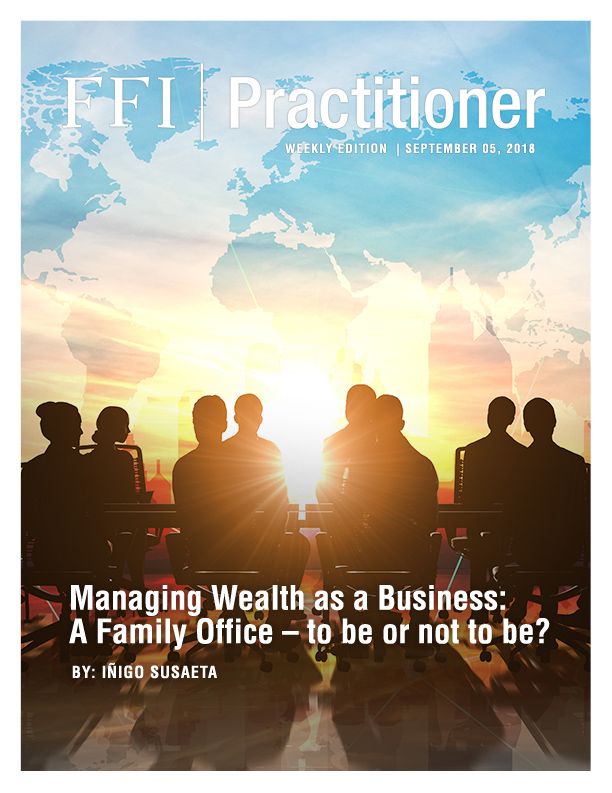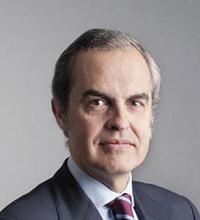Family Office
Managing Wealth as a Business: A Family Office – to be or not to be?
Weekly edition • September 05, 2018


From FFI Practitioner
When should a family begin to think about forming a family office and what factors should they consider when making this decision? Thank you to Iñigo Susaeta, this week’s contributor for continuing FFI Practitioner’s series of articles written in both English and Spanish by members of the FFI IberoAmerican Virtual Study Group.
Does it make sense to professionalize the management of my wealth (or that of my family), treating it in a manner comparable to how I treat my company or other businesses? In other words, should we create a family office?
More and more business-owning families are asking this question as a consequence of the problems and upheavals that affected family companies after the crisis of 2008. The answer to this question is not as simple as it appears. In my opinion, it requires an in-depth analysis of the reality and circumstances of each case — especially if the intention is to do things well with a realistic perspective on the medium-and long-term to achievability of sustainable family wealth. If this is not the intention, as the French painter, Francis Picabia, said, “It is better to do nothing than anything.”
It is necessary to ask specific questions in advance, about the requirements of the business-owning family – what are the objectives, the areas to develop for the scope of action, localization, and reserve requirements? Other good questions include: What material and human resources will be needed for the family office? How will it be financed? Will it be created alone or with the help of third parties?

As we know, each family enterprise has its peculiarities and requires a personalized approach. There are a variety of objectives for creating a family office: having a platform of services for the family, enhancing family cohesion among generations, stimulating the entrepreneurial spirit of the youngest members, or structuring the family protocol, among many others.
For these reasons, an important preliminary step is to clarify the objectives for the family office, given that these objectives will determine its mission, which generally allows for the alignment of family member interests as well as clarifying the functions that the family office will perform. The most common function is to perform services of an economic nature (wealth management), but there are companies that manage their family office in a more integral and strategic manner, including business planning, legal and fiscal counseling, education and training of family members, and philanthropic activity or social responsibility. In some cases, solutions to conflicts or personal problems are included.
“There are a variety of objectives for creating a family office: having a platform of services for the family, enhancing family cohesion among generations, stimulating the entrepreneurial spirit of the youngest members, or structuring the family protocol, among many others.”

Nonetheless, the essential point on which family business sustainability operates is the creation of a strategic family plan. I often use the fact that a successful business owner, who wants the company to grow, does not hesitate to make a strategic plan, as a way to suggest that this also is the first step in preserving and creating wealth.
The strategic family plan, if done well, must be constructed from a global, 360-degree perspective and inevitably lead to a diversified investment portfolio (real estate, business, private equity, and financial), which is to say global and strategic asset allocation. Let us not forget that, while there are those that think differently, the decision to invest is not a simple one. In the words of Stuart Lucas, “Wealth without values is just money!”
Sidebar

FFI Practitioner Article
by: Iñigo Susaeta
Over the past few years the Ibero-American region has become one of the regions with the greatest economic growth worldwide — thanks to, among other factors, the good working practices of business owners and their companies.
Before investing, we must have a plan that truly distributes money according to the interests, needs, and values of the family. There are no two family offices that invest the same way for the mere fact that no two families are alike. However, it is also an inarguable fact that all family offices, just as all business-owning families, must have a long-term objective and a plan to achieve it. In the words of Roman philosopher, Lucius Annaeus Seneca, in the 4th century B.C., “If a man knows not what harbor he seeks, any wind is the right wind.”
A strategic family plan is nothing more than the task of defining the current state of the business-owning family, a task on which the medium-and long-term objectives are established and constructing the process for achieving them. In every strategic family plan a strategic global portfolio for family investments must be constructed. There are profitability objectives and risk metrics that allow monitoring and managing the investment plan, making wealth work in accordance with the desires and interests of the family.
There is, however, another fundamental element for all of this to work: the team, and with it, the investments that are going to be made in material and human resources to effectively and efficiently meet the needs of the family. The alternatives that arise are basically: a) have a structure or “family office” with the hiring of an exclusive management team for the family, which will be responsible for managing the wealth like a distinct business unit; or, b) replicate the structure of a “multi-family office” with a professional team, which will assume all the functions of the family office as its own; lastly, c) create a small structure, “mixed solution,” that may be sustained in a “multi-family office.” A multi-family office is a business that, by employing a multidisciplinary team (specialists in taxes, law, investments, risk management, administration, and systems), allows for the operation of the family office of different families with independence and a guarantee of proven experience.
“Nonetheless, the essential point on which family business sustainability operates is the creation of a strategic family plan.”
The creation of a family office is a strategic decision that requires the establishment of clear objectives with a strategic plan that reflects the reality of the family from all angles. Only with a firm commitment from all family members, who consider as intangible values the alignment of interests, greater family trust, greater professionalization, and an improvement of familial relationships, will the desired result be obtained. As Benjamin Franklin once said, “Peace and harmony are the greatest wealth of the family.”
In conclusion, I offer ten questions that serve as a guide for those families that want to begin this process:
- Where are we?
- Where are we going?
- With whom are we going (member of the family)?
- What function/role does each family member perform?
- What needs must be met?
- What present and future wealth do we have?
- How does this wealth need to operate in order to meet the needs of the family?
- In what environment and situations will we manage the wealth?
- How do we professionalize the management of this wealth?
- How do we submit the wealth (including the business) to a process of risk management to allow for rational strategic decision making over time?
About the contributor

Iñigo Susaeta, CFBA, CFWA, is founder and managing partner of the Arcano Family Office in Madrid. He has thirty years of professional experience in private banking and wealth management and can be reached at isusaeta@arcanopartners.com.
About Arcano Family Office
Arcano acts as the integral family office for a series of family businesses. It develops and executes strategic plans. One of the characteristics of Arcano Family Office has been, and continues to be, proactivity in the study and research of the theories of constructing portfolios and strategic planning.

The FFI Virtual Study Group: Iberoamérica is an online forum to educate, connect and inspire members located in or interested in family enterprise issues in Latin America and Spain. The official language of the group is Spanish.
The Group extends FFI’s core mission by focusing on education and multidisciplinary learning. The Group seeks a multidisciplinary composition to broaden and enrich the learning experience of its members. A geographic mix is also a priority.
Related Articles
If you enjoyed this article, view the related articles that discuss how a single family office is a family-centric organization, and how the decision-making process within a family business can be one of the most complex issues confronting consultants.


